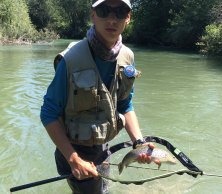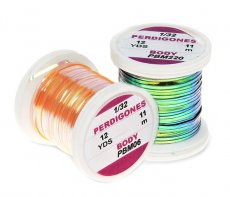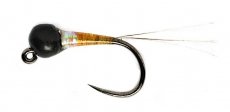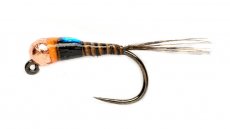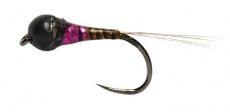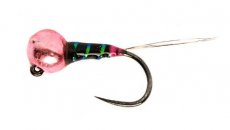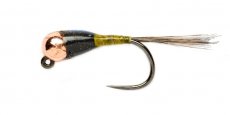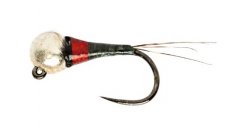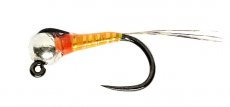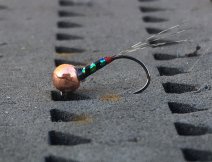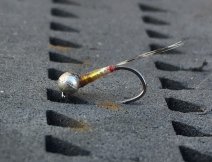All key information about the killing Spanish nymphs - Perdigon Nymphs.
Perdigon flies are Spanish nymph patterns, invented by Spanish competitors at their local streams, where trout are very careful and catching them is about true fly fishing skill.
In Spanish Perdigon means a shot (pellet) and it tells something already. The flies fall through the water column extremely quickly and have minimal resistance in the water, mainly due to the thin body embedded in UV resin and the absence of legs and body from dubbing. The difference in the sinking rate of Perdigon flies compared to other nymphs is really sharp and you can try it by the water. The classic jig nymph will have to be casted much more upstream to give the fly time to sink to the same depth as Perdigon in a much shorter time. So with Perdigons, you get much faster to the bottom where the fish is just eating. At the same time, these patterns are almost indestructible because of the body embedded in UV resin, which certainly does not tear any trout or other fish.
Perdigon is the most effective when fishing in fast water, where the fish do not have much time to see the fly, but that does not mean that you could not succeed with them even in the calmer water. Due to the rapid sinking rate trough the water column, Perdigon is most effective in catching salmonids. They are less suitable for catching coarse fish such as chubs and roach. These fish species feed more in the water column and the fly often falls through them before they even notice it.
In trout areas where coarse fish are abundant, Perdigons can significantly reduce their catches and fisherman will be more successful in catching salmonids.
As for the Perdigon fishing technique, they will be used in euro nymphing style with the French leader. Anyway, the difference, as the Spaniards or French do the nymphing, is quite large compared to our nymphing style (Czech one). Spaniards and French often fish with only one fly, and it is such a "more intensive fishing", for example, they more often re-cast the fly and make shorter drifts. However each country has slightly different rivers types and you will have to figure out the most succesfull style for your local conditions.
Fly Tying Materials
Perdigon flies are very simple to tie and you will certainly have a lot of necessary materials in your possession already. You can use all types of fly fishing hooks as described in my other article Top 5 Tungsten Nymph Hooks in sizes 16 and 18.
The basic materiasl for the Perdigon nymphs are:
Coq de Leon - Tail
Tying Threads - Tips (which I prefer in UV versions)
Colored Tinsles - Body
Colored Wires - Ribbing
However, you can also use completely natural materials, such as peacock feather.
There are, of course, also various special materials, made directly for Perdigon nymphs. Here I cannot forget to mention HENDS PERDIGONE PEARL BODY. These are high-iridiscence (changing) shine. They are produced in several interesting shades, but the real color show will start only after the body is covered with UV glue. Each Perdigone pearl body shade gives a different color effect and it is interesting to play with the base body material (usually tying thread) as this makes the final variety of shades even bigger .
For more natural Perdigon variations, it is good to use a material that is definitely known to all lovers of dry fly tying: HENDS BODY QUILLS. This binding material is translucent and by gradual layering we achieve bodies that pass towards the head from light to dark color. Always use light (white) thread with Body Quills, the material needs a light base to achieve the correct color transition. And since there is no limit to the imagination, you can experiment differently with the base layer under Body Quill. Even Perdigone Pearl Body or some other interesting tinsel can be attached underneath this material.
UV Adhesives and UV Lamps
An important step is to choose the right UV resin and lamp (flashlight), as both are necessary to tie Perdigon nymphs. Adhesive effluents must not appear on the surface after curing, otherwise the surface would be greasy and not transparent. The resin hardening is activated by UV radiation, which is made by a UV flashlight. For perfect hardening, you can still place the tied flies behind the window in sunlight.
The curing time depends on the wavelength of the light and the properties of the lacquer. Higher performance lamps are better for fast and quality hardening. As the batteries diminish, the lamp performance decreases, so you need to replace the batteries at the right time. There are lots of UV adhesives on the market and some are also available in color variants. Among the renowned manufacturers include GULLF, BUG BOND, FULLING MILL, LOON etc. With all these UV adhesives, however, the disadvantage for beginners is the higher purchase price.
I have personally tried different types of adhesives - from the most expensive to the cheapest from China, which did not last so long and the paint peeled off over time after some fishing. For tying the Perdigon nymphs I recommend thin lacquers, which better and faster pour irregularities on the body and work with it is easier and faster. Among the many tried and tested adhesives, I have proven to be Hends UV CLEAR FLY FINISH, which is completely sufficient for me and at a significantly lower price than the other products of renowned brands of similar quality.
The Black Trigger
A distinguishing feature of many Perdigon's designs is the black dot, created in place of an imaginary header, which is intended to create a natural trigger and to imitate the case of real insects. The trigger can be made with a variety of materials, such as colored UV lacquer, fly lacquer, or a black alcohol marker is all you need.
Have a lot of fun tying Perdigon nymphs and catching fish while fishing with them!
Tying a Perdigon Spanish Nymph with Davie McPhail







